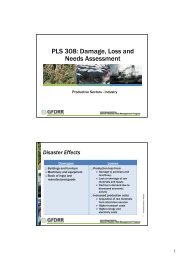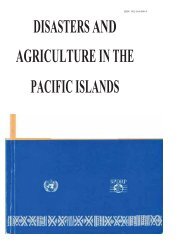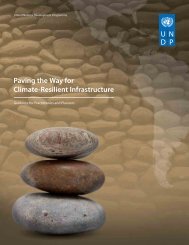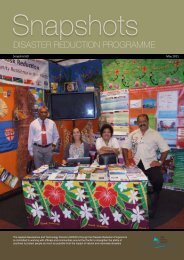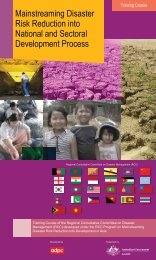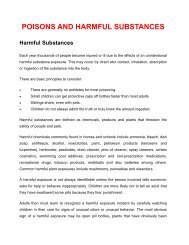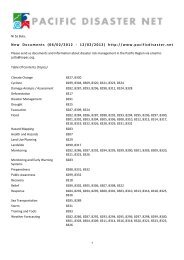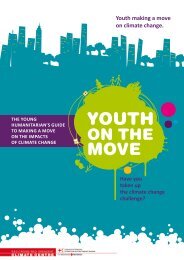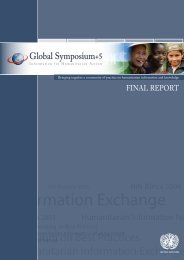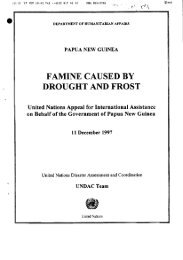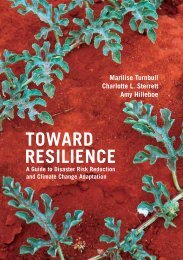A global review of disaster reduction initiatives - Welcome to the ...
A global review of disaster reduction initiatives - Welcome to the ...
A global review of disaster reduction initiatives - Welcome to the ...
Create successful ePaper yourself
Turn your PDF publications into a flip-book with our unique Google optimized e-Paper software.
Living with risk - focus on <strong>disaster</strong> risk <strong>reduction</strong>1Paired Perspectives: Two countries’ response <strong>to</strong> <strong>the</strong> same question in <strong>the</strong> ISDR questionnaire regarding <strong>the</strong>role <strong>of</strong> political commitment in <strong>disaster</strong> risk <strong>reduction</strong>.Country 1: A highly <strong>disaster</strong>-prone country, with considerable technical, material and financial resources,with strong political aspirations <strong>to</strong> modernize.Disaster mitigation is not a priority item, except at times <strong>of</strong> <strong>disaster</strong>. With many pressing requirements related <strong>to</strong>health, education, development, defence, etc., <strong>disaster</strong> mitigation must during normal times be given diminished attention.We do not think that an easy recipe exists <strong>to</strong> overcome <strong>the</strong>se obstacles.Country 2: A highly <strong>disaster</strong>-prone country, with few technical, material and financial resources, and muchgreater demands <strong>to</strong> realize its strong political aspirations <strong>to</strong> develop.It has been possible for <strong>the</strong> government <strong>to</strong> institutionalise <strong>the</strong> concept <strong>of</strong> <strong>disaster</strong> management and also <strong>to</strong> generatemomentum at <strong>the</strong> grass-roots level for self-reliance in coping with and responding <strong>to</strong> <strong>disaster</strong>s.Links <strong>to</strong> <strong>the</strong> pillars <strong>of</strong> sustainabledevelopmentThe socio-cultural contextThe links between <strong>disaster</strong> and <strong>the</strong> socio-culturalsystem are an important component in<strong>disaster</strong> risk <strong>reduction</strong> and a pillar <strong>of</strong> sustainabledevelopment. Social vulnerability is fur<strong>the</strong>rdiscussed in chapter two.The term culture is unders<strong>to</strong>od in a myriad <strong>of</strong>ways and represents an extremely complexnotion. It is, <strong>the</strong>refore, useful <strong>to</strong> provide a definition.Differences exist among groups <strong>of</strong> people, and<strong>the</strong>se differences reflect a variety <strong>of</strong> fac<strong>to</strong>rsincluding language, socio-economic and politicalsystems, religion and ethnicity as well as his<strong>to</strong>ricalexperience and relationships <strong>to</strong>wards nature.Each cultural group has its own set <strong>of</strong> experiencesand expectations. Fur<strong>the</strong>rmore, relationshipsbetween people and groups <strong>of</strong> differentcultures are <strong>of</strong>ten embedded in different sets <strong>of</strong>values, unequal power relations with somegroups becoming dominant and o<strong>the</strong>rs beingmarginalized. All <strong>of</strong> <strong>the</strong>se fac<strong>to</strong>rs are highly relevantin <strong>the</strong> context <strong>of</strong> natural <strong>disaster</strong>s.Much early thinking about <strong>disaster</strong>s was basedon a notion <strong>of</strong> nature and culture being separate.Disasters were seen as <strong>the</strong> products <strong>of</strong> aprecocious and unpredictable nature and<strong>the</strong>refore <strong>to</strong> be out <strong>of</strong> <strong>the</strong> control <strong>of</strong> humans orreferred <strong>to</strong> in terms such as acts <strong>of</strong> supernaturalforces, or acts <strong>of</strong> god.Philosophical definition <strong>of</strong> culture: The way <strong>of</strong> life <strong>of</strong> a people,including <strong>the</strong> attitudes, values, beliefs, arts, sciences,modes <strong>of</strong> perception, and habits <strong>of</strong> thought and activity.Cultural features <strong>of</strong> forms <strong>of</strong> life are learned but are <strong>of</strong>ten<strong>to</strong>o pervasive <strong>to</strong> be readily noticed from within.Psychological definition <strong>of</strong> culture: The sum <strong>to</strong>tal <strong>of</strong> <strong>the</strong>ideas, beliefs, cus<strong>to</strong>ms, values, knowledge and materialartefacts that are handed from one generation <strong>to</strong> <strong>the</strong> next ina society.It became increasingly obvious that <strong>the</strong> causes<strong>of</strong> <strong>disaster</strong>s are complex and that beside naturepeople are a causal fac<strong>to</strong>r. Looking beyondbeliefs, more and more <strong>disaster</strong>s are unders<strong>to</strong>odin terms <strong>of</strong> <strong>the</strong>ir cultural and social components.Vast differences in <strong>disaster</strong> vulnerabilityamong countries and within individual societieshave <strong>the</strong>ir roots in unequal sets <strong>of</strong> powerrelations, leading <strong>to</strong> unequal distribution andaccess <strong>to</strong> wealth among different cultures orpolitical settings.It is important that ownership <strong>of</strong> <strong>the</strong> <strong>disaster</strong>context is not stripped from local people who canbe left even more powerless than would be <strong>the</strong>case if external intervention did not occur. Thereis a growing appreciation <strong>of</strong> <strong>the</strong> need for <strong>disaster</strong><strong>reduction</strong> activities <strong>to</strong> be based on more attentiveparticipa<strong>to</strong>ry approaches involving local communitiesas much as possible, considering <strong>the</strong>m asproactive stakeholders and not passive targets forintervention.Common sense solutions in one cultural settingare <strong>of</strong>ten contrary <strong>to</strong> what may be commonsense in o<strong>the</strong>rs. Local socio-political structures31



